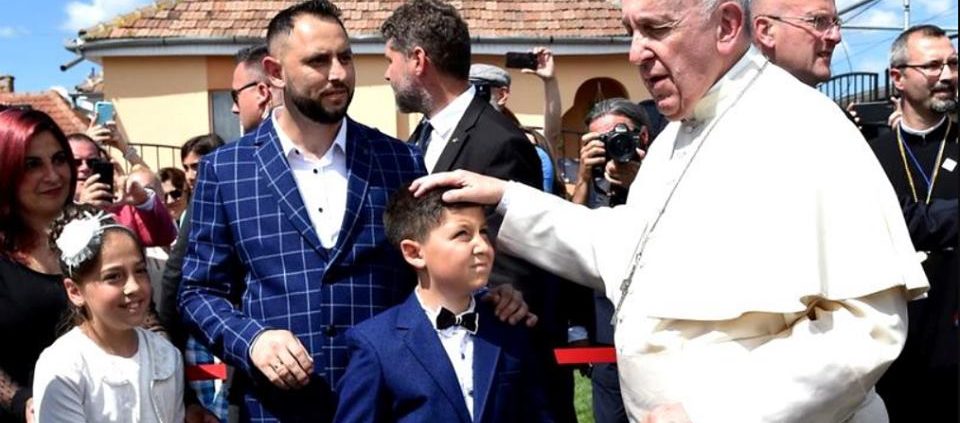Pope apologizes to gypsies for ‘discrimination and segregation’
Jun 2, 2019
FAITH AND CULTURE CORRESPONDENT
Pope Francis presides over the celebration of Divine Liturgy and the beatification of seven martyred bishops of the Eastern-rite Romanian Catholic Church, in Blaj, Romania, Sunday, June 2, 2019. Francis was traveling across Romania to visit its far-flung Catholic communities to make up for the fact that St. John Paul II was only allowed to visit the capital, Bucharest, in 1999 in the first papal visit to a majority Orthodox country. (Credit: AP Photo/Andrew Medichini.)
BLAJ, Romania – While visiting the famously impoverished and marginalized gypsy community in Romania, Pope Francis asked forgiveness on behalf of the Catholic Church for the discrimination and mistreatment that they have endured.
On the last day of his May 31 to June 2 visit to Romania, the pope said his heart was “heavy,” being weighed down “by the many experiences of discrimination, segregation and mistreatment” that the Roma community, also known as gypsies, have experienced.
“History tells us that Christians too, including Catholics, are not strangers to such evil. I would like to ask your forgiveness for this. I ask forgiveness – in the name of the Church and of the Lord – and I ask forgiveness of you,” he said.
Francis stressed that “in Christ’s Church, there is room for everyone,” while condemning the indifference that “breeds prejudices and fosters anger and resentment.”
The meeting with the Roma people in Romania closes a circle, since the pope met with a small delegation of gypsies at Domus Sancta Martae where he lives right before leaving for the Eastern European country.
On Sunday, gypsy families and children greeted the pontiff in the Barbu Lăutaru neighborhood in the northern city of Blaj. Three representatives of the community asked the pontiff questions and voiced their concerns, and a Greek Catholic priest of Roma descent spoke of his experience.
Romania has one of the largest Roma communities in Europe (about 10 percent of the population) and while official numbers register 600,000 people, the real figure might be closer to 2 million.
Their nomad culture makes gypsies apt at assimilating the religious and linguistic profiles of their welcoming country. Reflecting the religious makeup in Romania, more than 70 percent of Roma people identify as Orthodox while the remaining 7 percent is Catholic or Protestant, according to the latest census.
The Roma suffered persecution and were sent to work and concentration camps during Nazi occupation. Their numbers now as high as 12 million, they are today the largest ethnic minority in Europe. Still they live on the outskirts of society, with 95 percent of the population amassed in deprived settlements where often they have no access to electricity or running water.
Given their painful past, the pope told the Roma community in Romania that they are “at a crossroads” having to choose reconciliation or revenge.
“Let us choose the way of Jesus,” Francis said. “It is a way that demands effort, but the way that brings peace. And it passes through forgiveness.”
Integration of the Roma people in Europe continues to be struggle, since their culture struggles to adapt to the demands of Western society and, in return, they are often met with racism and prejudice.
“This a people with a style and way of life that is different from ours,” said Liviu – Petru Zăpîrţan, Romanian Ambassador to the Holy See, in a May 24 interview with Crux. “European institutions have found the uses and customs of this people, for example the fact that the youth get married at 11-12 years old, very difficult.”
The gypsy community is also known as the “children people” since getting married and having children very young is encouraged. In several European Union countries – including Romania – 42 percent of Roma people finish primary education, while only 10 percent end up finishing high school, a 2008 Open Society Institute survey found.
According to Zăpîrţan, “the Roma problem is not a Romania, Hungarian or Italian problem, it’s a European problem. Only together will we be able to regulate their situation and make efforts to integrate them and socialize them with European laws. They have very strong life views, but they are not incompatible with European lifestyles.”
Francis told the Roma community that they “have a great role to play” and to not be afraid to share the beauty and richness of their culture with the world, namely the emphasis they place on the family, concern for the vulnerable, respect for the elderly and hospitality.
“I would encourage you to journey together, wherever you are, in helping to build a more humane world, overcoming fear and suspicion, breaking down the barriers that separate us from others, and encouraging mutual trust in the patient and never fruitless search for fraternity,” he concluded.
Crux
Papa se ispričava Romima zbog “diskriminacije i segregacije”
VJERNI I KULTURNI DOPISNIK
Papa Franjo predsjeda slavljem Božanske liturgije i beatifikacijom sedam mučenih biskupa rumunjske katoličke crkve istočnog obreda, u Blaju, u Rumunjskoj, u nedjelju, 2. lipnja 2019. godine. Franjo je putovao po Rumunjskoj kako bi posjetio svoje daleke katoličke zajednice kako bi nadoknadio činjenicu da je sv. Ivanu Pavao II. dopušteno posjetiti samo glavni grad Bukurešt 1999. godine u prvoj papinoj posjeti većinski pravoslavnoj zemlji. (Autor: AP Photo / Andrew Medichini.)
BLAJ, Rumunjska – Tijekom posjeta slavno osiromašenoj i marginaliziranoj romskoj zajednici u Rumunjskoj, papa Franjo je u ime Katoličke crkve zatražio oprost zbog diskriminacije i zlostavljanja koje su pretrpjeli.
Posljednjeg dana svojeg posjeta Rumunjskoj od 31. svibnja do 2. lipnja, Papa je kazao kako mu je srce “teško”, što je opterećeno “mnogim iskustvima diskriminacije, segregacije i zlostavljanja” koje romskoj zajednici, također poznata što su Cigani, i doživjeli.
“Povijest nam govori da i kršćani, uključujući katolike, nisu stranci takvom zlu. Za ovo htio bih vas pitati za oprost. Tražim oprost – u ime Crkve i Gospodina – i tražim oprost od vas, “rekao je.
Franjo je naglasio da “u Kristovoj Crkvi ima mjesta za svakoga”, dok osuđuje ravnodušnost koja “stvara predrasude i potiče gnjev i ljutnju”. Susret s Romima u Rumunjskoj zatvara krug, budući da se Papa susreo s malim izaslanstvom Roma kod Domus Sancta Martae koji je živjeo neposredno prije odlaska u istočnoeuropsku zemlju.
U nedjelju su romske obitelji i djeca pozdravili Papo u susjedstvu Barbu Lăutaru u sjevernom gradu Blaju. Trojica predstavnika zajednice postavila su papa pitanja i izrazila svoju zabrinutost, a grčki katolički svećenik romskog podrijetla govorio je o njegovom iskustvu.Rumunjska ima jednu od najvećih romskih zajednica u Europi (oko 10 posto stanovništva) i dok službeni brojevi bilježe 600.000 ljudi, stvarni broj bi mogao biti bliži 2 milijuna.
Njihova nomadska kultura čini Rome sposobnima da asimiliraju vjerske i jezične profile svoje zemlje dobrodošlice. Razmišljajući o vjerskom sastavu u Rumunjskoj, više od 70 posto Roma identificira se kao pravoslavci, dok je preostalih 7 posto katolika ili protestant, prema posljednjem popisu.
Romi su bili izloženi progonu i poslani su na prinudni rad i koncentracijske logore za vrijeme nacističke okupacije. Njihov broj sada iznosi čak 12 milijuna, a danas su najveća etnička manjina u Europi. Ipak, oni žive na periferiji društva, sa 95 posto stanovništva skupljeno u depriviranim naseljima gdje često nemaju pristup električnoj energiji ili tekućoj vodi.S obzirom na njihovu bolnu prošlost, papa je romskoj zajednici u Rumunjskoj rekao da su “na raskršću” da moraju izabrati pomirenje ili osvjetu.
“Hajdemo odabrati Isusov put”, reče Francis. “To je način koji zahtijeva napor, ali način na koji donosi mir. I prolazi kroz oproštenje. ”
Integracija Roma u Europi i dalje je borba, budući da se njihova kultura bori za prilagodbu zahtjevima zapadnog društva i, zauzvrat, često se susreće s rasizmom i predrasudama.
“To je narod sa stilom i načinom života koji se razlikuje od našeg”, rekao je Liviu – Petru Zăpîrţan, rumunjski veleposlanik pri Svetoj Stolici, u intervjuu 24. svibnja s Cruxom. “Europske institucije pronašle su namjenu i običaje ovih ljudi, na primjer činjenica da se mladi vjenčaju u dobi od 11-12 godina, vrlo teško”.
Romska zajednica je također poznata da su „djeca “ budući da se potiču na brak djecu vrlo mlade. U nekoliko zemalja Europske unije – uključujući Rumunjsku – 42 posto Roma završava osnovno obrazovanje, dok samo 10 posto završava srednju školu, pokazalo je istraživanje Instituta otvoreno društvo 2008. godine.
Prema Zăpîrţanu, “problem Roma nije problem Rumunjske, Mađarske ili Italije, to je europski problem. Samo zajedno možemo regulirati svoju situaciju i uložiti napore da ih integriramo i socijaliziramo s europskim zakonima. Imaju vrlo jake životne poglede, ali nisu nespojivi s europskim načinom života. ”
Franjo je rekao romskoj zajednici da “igraju veliku ulogu” i da se ne boje podijeliti ljepotu i bogatstvo svoje kulture sa svijetom, odnosno naglasak koji stavljaju na obitelj, brigu za ranjive, poštivanje starije osobe i gostoljubivost.”Ohrabrujem vas da putujete zajedno, gdje god se nalazili, pomažući izgraditi humaniji svijet, svladavajući strah i sumnju, razbijajući barijere koje nas razdvajaju od drugih, te potičući uzajamno povjerenje i strpljivu i nikada neplodnu potragu za bratstvom – zaključio je.



